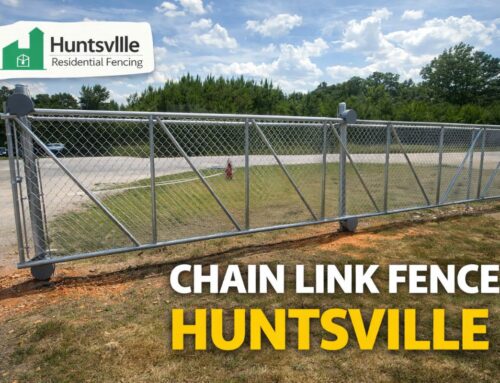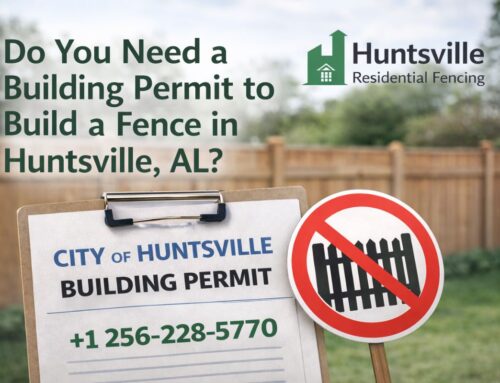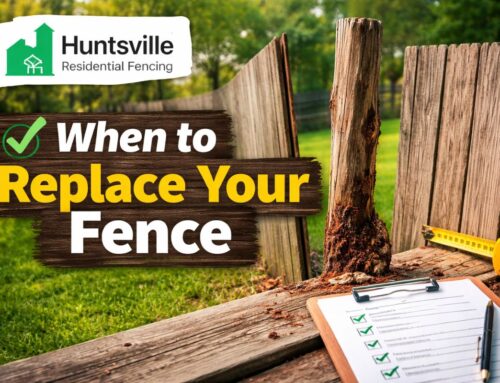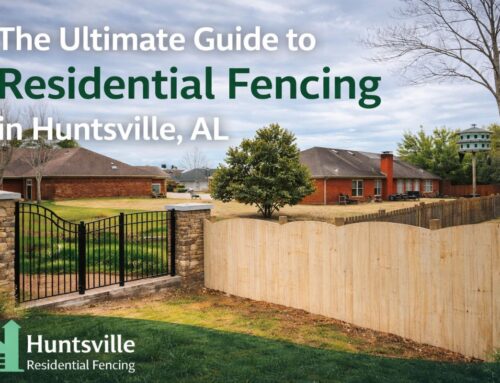Vinyl vs Wood Privacy Fence – Learn the Key Differences Before Choosing
Many homeowners face a dilemma when choosing between vinyl vs wood privacy fence. Both offer unique advantages, making it hard to decide which is best for your needs.
Vinyl fences are durable, weather-resistant, and low-maintenance, while wood fences provide natural beauty and customization options. Wood requires regular upkeep, whereas vinyl offers long-term savings. Each option suits different preferences and budgets, adding unique value to your property.
This article compares vinyl and wood fences based on their features, helping you make the best choice. Huntsville Residential Fencing AL can help you make a precise decision and install a privacy fence in your property.
Vinyl vs Wood Privacy Fence – Detailed Comparison
Choosing between vinyl and wood privacy fences depends on your needs. Both options have pros and cons in terms of durability, maintenance, cost, and material benefits. Let’s explore these factors to help you make an informed decision.
Vinyl vs Wood Privacy Fence – Key Feature Comparison
| Aspect | Wood Privacy Fence | Vinyl Privacy Fence |
|---|---|---|
| Durability | 15–20 years; prone to rot and pests | 20+ years; resists rot and decay |
| Maintenance | Regular staining and repairs are needed | Minimal cleaning; rare, costly repairs |
| Cost | Cheaper upfront; expensive long-term | Higher upfront; saves over time |
| Appearance | Natural and warm look | Clean, modern, polished look |
| Customization | Highly customizable with paint/stains | Limited; mostly panel colors and textures |
| Eco Impact | Biodegradable; forest impact | Not biodegradable; long-lasting |
Durability
Vinyl
Vinyl fences are long-lasting and built to withstand tough weather conditions. They resist rot, pests, and decay, unlike wood. Vinyl doesn’t splinter or warp over time. It can endure over 20 years with minimal issues. However, vinyl may crack under significant impact or extreme temperature shifts, though this is rare. Its durability makes it a popular choice for homeowners seeking low-maintenance options.
Wood
Wood fences are sturdy but less durable than vinyl. They typically last 15–20 years with proper care. However, they are prone to rot, warping, and splitting due to weather exposure or termites. Treating and sealing the wood regularly helps extend its life. While wood is naturally strong, it cannot match the longevity and weather resistance of vinyl, making it more susceptible to wear and tear.
Maintenance/Repairs
Vinyl
Require minimal maintenance. A simple rinse with water or soap keeps them clean. They don’t need painting or staining, saving you time and effort. Repairs are rare but can be expensive, as entire panels often need replacing instead of single parts. Despite this, their low upkeep makes them an excellent option for busy homeowners.
Wood
More attention is necessary. They need regular staining or painting to maintain their look and protect against rot. Damaged boards are easier and cheaper to replace than vinyl panels, but frequent repairs may add up over time. Routine inspections for pests or damage are essential for keeping your wood fence in top shape.
Cost
Vinyl
Cost more upfront but are a long-term investment. Their low maintenance and durability reduce future expenses. While the initial price may seem high, they often save money by avoiding frequent repairs or replacements, offering excellent value over time.
Wood
Cheaper to install, making vinyl fences an attractive choice for budget-conscious buyers. However, long-term costs add up due to maintenance, staining, and repairs. Over time, the total cost of ownership for a wood fence often exceeds that of a vinyl fence despite the lower starting price.
Benefits/Drawbacks of Materials
Vinyl
Durable, weather-resistant, and low-maintenance. They offer a clean, modern look but lack the natural charm of wood. While they cost more upfront, they save on long-term expenses.
Wood
Wood fences provide a classic, natural appearance. They’re affordable and customizable but require regular upkeep. Their charm comes with drawbacks like rot, pests, and weather-related damage, making them less practical for long-term use.
Environmental Impact
Vinyl
Made from PVC, a plastic material. While durable, their production involves chemicals and energy, impacting the environment. Vinyl isn’t biodegradable, which adds to waste if not recycled. However, its long lifespan reduces the need for frequent replacements, making it a less wasteful option over time. Many companies now offer eco-friendly vinyl made from recycled materials to lower environmental harm.
Wood
These fences are natural and biodegradable, making them eco-friendlier than vinyl. However, cutting down trees for fencing contributes to deforestation. Treated wood can have chemicals that harm the soil over time. Choosing sustainably sourced wood or untreated options helps reduce environmental impact. Wood’s renewable nature and potential for recycling make it a better choice for those prioritizing eco-conscious living.
Design Options
Vinyl
Come in a variety of styles and colors. They mimic wood or offer sleek, modern designs. Unlike wood, vinyl doesn’t require painting or staining to maintain its look. You can customize heights and textures for more privacy or a decorative touch. These features make vinyl a versatile option for various tastes.
Wood
Offer unmatched customization. You can paint, stain, or carve them to suit any style. From picket to board-on-board designs, wood provides endless possibilities. Its natural look fits traditional or rustic homes. While it requires upkeep to keep its charm, wood’s flexibility allows for unique and personalized fencing styles.
Home Resale Value
Vinyl
Add value by appealing to buyers who prefer low-maintenance homes. They’re durable, weather-resistant, and long-lasting. Homeowners see them as a cost-effective investment, especially in neighborhoods where modern designs are popular. However, some buyers might prefer the natural charm of wood.
Wood
Increase a home’s value by adding natural beauty and custom appeal. Many buyers appreciate the classic look and feel of wood. However, its maintenance needs can deter some. If well-kept, wood fences offer a significant boost to resale value, especially in areas where traditional designs are desired.
Aesthetics
Vinyl
Vinyl fences have a clean, polished look. They mimic wood textures or come in modern finishes, fitting contemporary homes. While they lack the warmth of natural wood, their neat appearance appeals to homeowners seeking minimal upkeep and long-lasting beauty.
Wood
Wood fences exude natural charm. Their grains and textures offer a unique, warm feel that’s hard to replicate. Whether left untreated or painted, wood enhances the beauty of any property. While they require upkeep, their aesthetic appeal remains timeless and versatile.
Choosing the Right Fence – Priorities and Recommendations
| Priority | Best Option | Reason |
|---|---|---|
| Low Maintenance | Vinyl | Requires only occasional cleaning, no staining |
| Classic Look | Wood | Natural charm; customizable with paint/stains |
| Long-Term Value | Vinyl | Durable, saves on future repairs and maintenance |
| Eco-Friendliness | Wood | Biodegradable; can choose sustainably sourced options |
| Quick Installation | Vinyl | Lightweight panels snap together quickly |
Ease of Installation
Vinyl
Lightweight and come in pre-made panels, making installation quicker. They often snap or lock together with simple connectors. This saves time and effort, even for DIY projects. However, precise measurements and level ground are essential for proper fitting. While vinyl requires less expertise than wood, professional installation ensures the best results and longer-lasting fences.
Wood
Need more effort to install. Each plank or board is attached individually, requiring tools like hammers or drills. Posts must be set in concrete for stability, adding to the work. While customization options are greater, wood installation is time-intensive. Skilled labor is often needed for a professional look, but dedicated DIYers can also achieve good results with patience.
Strength
Vinyl
Strong against weather and pests. They won’t rot or warp, even in rain or extreme sun. However, they can crack under heavy impact or extreme cold. Their flexible nature allows them to withstand moderate pressure, but they’re not ideal for heavy-duty use. For everyday residential needs, vinyl strength is reliable.
Wood
Sturdy but less resistant to environmental factors. They can rot, warp, or split over time, especially without proper treatment. However, well-maintained wood can endure heavy winds and physical impact. Their strength depends on the type of wood used, with hardwoods like cedar or oak offering the best durability. Regular maintenance is key to preserving wood’s strength.
Vinyl vs Wood Privacy Fence – Which One to Choose?
When selecting between vinyl and wood privacy fences, consider durability, cost, and style preferences. Let’s decide.
Choose Vinyl
- Vinyl lasts longer and resists weather, pests, and rot better than wood.
- Requires little maintenance—just occasional cleaning—saving you time and effort in the long run.
- Modern designs mimic wood, offering durability with style for a sleek, low-maintenance look.
Choose Wood
- Offers a natural charm that suits traditional or rustic-style homes beautifully.
- Customizable with stains or paints for a unique look tailored to your preference.
- Affordable, upfront cost, but needs regular upkeep like staining or sealing for longevity.
Wanna increase the value of your property? Call Huntsville Residential Fencing AL today and install a privacy fence to improve the charm, protection, and value of your home.
FAQ
What is a privacy fence?
A privacy fence is a tall, solid barrier made from wood, vinyl, or composite materials that blocks visibility, reduces noise, and provides security by fully separating your yard from neighboring properties.
How much does a privacy fence cost?
A privacy fence typically costs $15–$45 per linear foot, depending on the material, height, and labor. Wood is usually cheaper, while vinyl and composite options cost more but require less maintenance.
How tall can a privacy fence be?
Most privacy fences range from 6 to 8 feet tall. Local zoning rules may limit height, so always check city regulations before building to avoid fines or required adjustments.
How do you install a privacy fence?
Installation involves marking the layout, digging post holes, setting posts in concrete, attaching rails, and securing fence panels or pickets. Proper leveling and spacing ensure a sturdy, long-lasting fence.
How much does a wood privacy fence cost?
A wood privacy fence usually costs $20–$35 per linear foot. Prices vary based on lumber type, height, and installation complexity. Cedar and redwood are higher-end, while pine is more affordable.





